News
NNPC, NCC Get New Helmsmen …As FG Loses $6.4trn To NNPC’s ‘Rogue’ Crude Sales
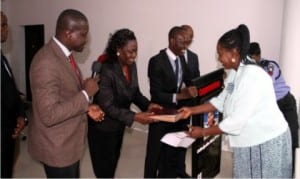
Rivers State Deputy Governor, Dr. (Mrs) Ipalibo Harry Banigo (right) receiving a souvenir from the delegation of Christian Medical and Dental Association, led by the State Chairman, Dr. Friday Aaron (left), when the latter paid a courtesy call on her in Government House, Port Harcourt, recently
President Muhammadu Buhari has appointed Dr. Emmanuel Ibe Kachikwu as the Group Managing Director of the Nigerian National Petroleum Corporation (NNPC).
Kachikwu, who was the Executive Vice Chairman and General Counsel of Exxon-Mobil (Africa), is to take over from Dr. Joseph Thlama Dawha.
Kachikwu hails from Onicha-Ugbo in Aniocha North Local Government Area of Delta State.
He is a First Class Graduate of Law from the University of Nigeria, Nsukka and the Nigerian Law School.
The new NNPC Chief Executive also has Masters and Doctorate Degrees in Law from the Harvard Law School.
He started his working career with the Nigerian/American Merchant Bank before moving on to Texaco Nigeria Limited where he remained for about eight years before joining Exxon-Mobil.
Buhari has also approved the appointment of Professor Umaru Garba Danbatta as the new Executive Vice Chairman and Chief Executive of the Nigerian Communications Commission (NCC).
Danbatta, who holds a Doctorate Degree in Electronic Engineering, takes over from Dr. Eugene Juwah whose tenure expired on July 29, 2015.
The new NCC Chief Executive’s other academic qualifications include a Bachelor’s Degree in Electronic Engineering and Telecommunications as well as a Master’s Degree in the same field.
He is a Fellow of the Nigerian Society of Engineers and has had a meritorious career in which he rose to become Professor of Electrical Engineering and Electronics at Bayero University, Kano, specialising in Telecommunications Engineering and Information and Communications Technology.
Before his new appointment, Danbatta held top management and leadership positions at different times including Head of Department, Dean Of Faculty, Director, Centre for Information Technology, Chairman of the Nigerian Society of Engineers (Kano Branch), Deputy Vice Chancellor and Acting Vice Chancellor.
His appointment as Executive Vice Chairman of the NCC is for five years in the first instance.
Meanwhile, Nigeria would have been buoyant enough to finance its 2015 budget of N4.36 trillion and still pay off its external debts of N2.03 trillion if it had not lost more than that amount — $32 billion (N6.4 trillion at N200/$1) — to massive corruption that characterised oil sales by the Nigerian National Petroleum Corporation (NNPC) during the last administration, a new report has said.
An independent investigative analysis by the Natural Resource Governance Institute (NRGI) has revealed that over $32 billion oil revenue was lost to NNPC’s mismanagement of Domestic Crude Allocation (DCA), opaque revenue retention practices and corruption-ridden oil-for-product swap agreements.
The report offered a deep, independent analysis of how NNPC sells its oil, and found that the national oil company’s discretionary spending from domestic crude oil sale revenues has skyrocketed, exceeding $6 billion a year for the 2011 to 2013 period (i.e. over $18 billion in three years).
Also, the in-depth research found no evidence that NNPC, between 2004 and 2014, forwarded to the treasury any revenues from sales of Okono crude with volumes of over 100 million barrels, with an estimated value of $12.3 billion.
In other words, the corporation has provided no public accounting of how it used a decade’s worth of revenues from an entire stream of the country’s oil production.
In the same manner, losses from three provisions in a single, offshore processing agreements (OPAs) contract, estimated at $381 million in one year (or over $1.9 billion between 2010 till date), were identified.
This is aside the fact that NNPC channelled Nigeria’s precious crude — worth $35 billion –to swap deals between 2010 and 2014, the recent offshore processing agreements (OPAs) containing unbalanced terms that did not efficiently serve Nigeria’s needs and interest.
The report, whose executive summary was made available to newsmen ahead of its public release yesterday, provided additional insight regarding the monumental corruption characterizing NNPC operations and those of its subsidiaries.
The document argued that NNPC’s approach to oil sales has remained riddled with corruption largely because of its inability to either develop its own commercial or operational capacities, or facilitate the growth of the sector through external investment.
Corroborating the NEITI, PwC and Reconciliation Committee’s assertions about NNPC’s legacy of inefficiency and mismanagement, NRGI researchers submitted that NNPC’s mismanagement of public revenues and its performance failures has persisted due to lack of political will by successive governments to reform the corporation.
The report pointed at the degenerating management of NNPC’s oil sales in recent years—and particularly since 2010.
The problems, it said, stemmed from the rising number of ad hoc, makeshift practices the corporation has introduced to work around its deeper structural problems.
For instance, the corporation entered into a poorly designed oil-for-product swap deals when it could no longer meet the country’s fuel needs.
Similarly, it began unilaterally spending billions of dollars in crude oil revenues each year, rather than transferring them to the treasury, because its actual budgets consistently fail to cover operating expenses.
Some of these makeshift practices began with credible goals, the report said. But over time, their operation became overly discretionary and complex, as political and patronage agendas surpassed the importance of maximizing returns.
The report identified five key areas bordering on the most pressing problems enveloping NNPC oil sales.
Researchers said they arrived at their findings after reviewing published and unpublished official records, together with data from trade publications and secondary literature, and conducted dozens of interviews between 2010 and 2015.
The report made valuable recommendations, which somehow buttressed a recent statement by Kaduna Governor, Nasir El-Rufai, about the need to either scrap the NNPC or reform the oil and gas sector as a whole.
News
Ibas Inaugurates RSIEC, Service Commissions, Healthcare Board In Rivers …Charges Appointees To Embrace Principles Of Service
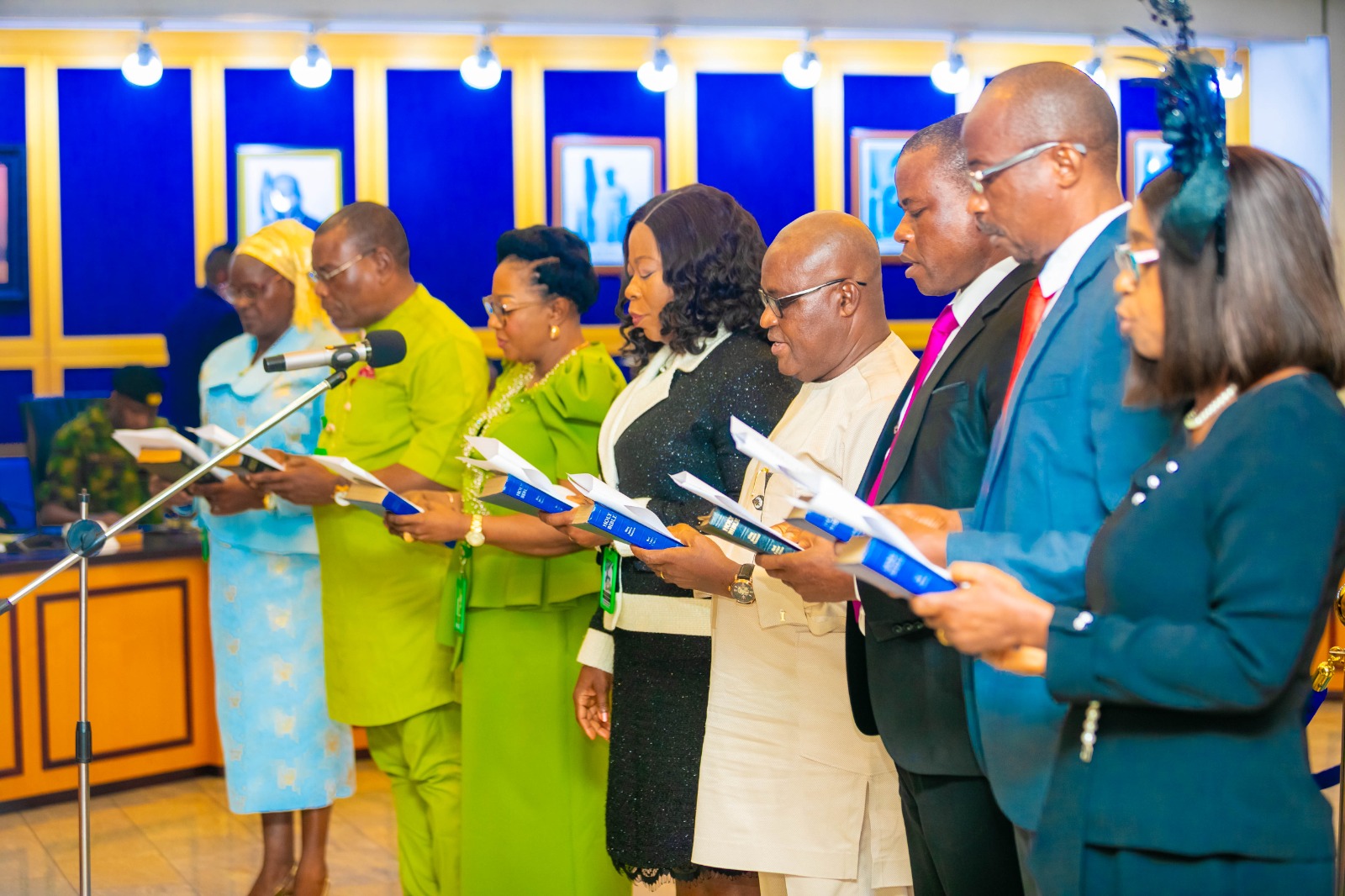
The Administrator of Rivers State, Vice Admiral (Rtd) Ibok-Ete Ibas, has charged newly appointed Board members to uphold the highest standards of discipline, competence, integrity, and unwavering dedication in their service to the State.
He emphasized that such commitment is critical to stabilizing governance, restoring democratic institutions, and advancing the principles of good governance in the State.
This was contained in a statement by the Administrator’s Senior Special Adviser on Media, Hector Igbikiowubo on Monday.
Ibas issued the charge on Monday while inaugurating the reconstituted Rivers State Independent Electoral Commission (RSIEC), Rivers State Civil Service Commission, Rivers State Local Government Service Commission, and the Rivers State Primary Health Care Management Board at Government House, Port Harcourt.
The Administrator urged the new appointees to embrace their roles with diligence, patriotism, and a commitment to transforming Rivers State through excellent service.
Addressing the Chairman and members of RSIEC, Ibas underscored their pivotal role in ensuring credible local government elections that reflect the will of the people.
“Your task is clear but demanding: to conduct free, fair, transparent, and credible elections at the grassroots level. You must resist bias, favoritism, and external interference while restoring public confidence in the electoral process,” he stated.
“The independence of your actions is crucial to sustaining peace, stability, and grassroots governance. I urge you to act with fairness, impartiality, and professionalism—even in the face of difficult choices,” Ibas added.
The Sole Administrator also charged the Rivers State Civil Service Commission on the need to eliminate mediocrity and foster a culture of excellence through merit-based recruitment, training, and promotions.
“The civil service must transition from favoritism to competence, integrity, and accountability. Your commission will lead reforms, including digital transformation and standardized practices across ministries, departments, and agencies,” he said.
He disclosed that extensive training programmes are underway, with a committee set up to overhaul the public service framework for greater efficiency.
Meanwhile, Ibas urged the Rivers State Local Government Service Commission to ensure professionalism and discipline in local government administration.
“As the closest tier of government to the people, you must drive reforms that insulate the system from politics and mediocrity. Your mandate includes merit-based recruitment, training, and enforcing standards for effective service delivery,” he stated.
In the same vein, the Administrator charged the Rivers State Primary Health Care Management Board with revitalizing healthcare delivery across the state’s 23 local government areas.
“Primary healthcare is the foundation of a sustainable health system. Your board must ensure facilities are adequately staffed, equipped, and operational focusing on maternal health, immunization, malaria control, and community health services,” he said.
He emphasized data-driven operations, incentives for rural health workers, and restoring the referral system to improve healthcare access.
He also assured the Board of sustained government support, including funding, for the effective discharge of their mandates but warned that board members would be held accountable for their performance.
The newly inaugurated members include: RSIEC: Dr. Michael Ekpai Odey (Chairman) with Prof. Arthur Nwafor, Prof. Joyce Akaninwor, and others as members.
Civil Service Commission: Dr. Livinus Bariki (Chairman), Amb. Lot Egopija, Mrs. Maeve Bestman, and others.
Local Govt. Service Commission: Mr. Isreal Amadi (Chairman), Rear Adm. Emmanuel Ofik (Rtd), Dr. Tonye Pepple, and others.
Primary Health Care Board: Dr. Dawari George (Chairman), Dr. Chituru Adiele (Executive Director), Prof. Kaladada Korubo, and representatives from key ministries.
News
Rivers PDP Debunks Sale Of LGA Election Forms
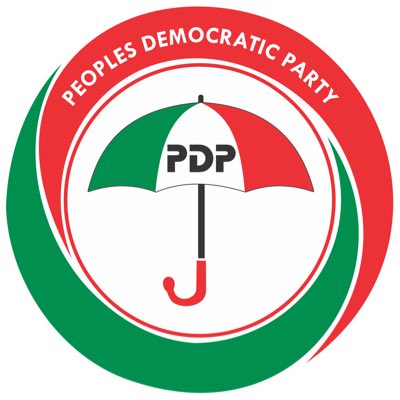
The Publicity Secretary of the Peoples Democratic Party (PDP) in Rivers State, Dr. Kenneth Yowika, has debunked claims that the party has commenced sale of forms for chairmanship and councillorship elections across the 23 local government areas of the state.
Yowika made the rebuttal in a statement made available to newsmen on Wednesday, describing the publication on the social media as baseless and untrue.
He urged members of the PDP to disregard the claim, saying that official communication regarding the sale of forms would be disclosed through the appropriate channels.
“With reference to information trending on social media, it has been falsely claimed that the sale of forms for Chairmanship and Councillorship elections in the 23 Local Government Areas (LGAs) of Rivers State will begin soon.
“However, the party has firmly denied these rumours, stating that they are baseless and untrue.
“The party has its own established methods of reaching out to its numerous supporters.
“The People’s Democratic Party, a law-abiding organisation, will patiently await the release of guidelines from the recently inaugurated Rivers State Independent Electoral Commission (RSIEC) before considering any sale of election forms.
“The PDP is urging its members to remain calm as official communication regarding the sale of forms will be disclosed through appropriate channels,” the statement read.
Enoch Epelle
News
South-South contributes N34trn to Nigeria’s economy in 2024 – Institute
Prof. Pius Olanrewaju, President of the Chartered Institute of Bankers of Nigeria (CIBN), has stated that the South-South region contributes N34 trillion to country’s economy in 2024.
He made the remark at the South-South Zonal Banking and Finance Conference in Calabar, yesterday.
He spoke on the theme, ‘’Building An Inclusive South-South: Economic Diversification as a Catalyst For Development.’’
Olanrewaju, who quoted the data from the Cable Data Index, said the feat was more than 21 per cent of Nigeria’s real Gross Domestic Product (GDP).
The president described the growth as ‘’ impressive,’’ saying that it was not driven by oil alone but significant expansions in trade, services, and the creative industries.
According to him, to fully harness this potential, coordinated financial, technological, and policy support is essential.
“As we work to reposition the South-South for broad-based prosperity, the financial system must play a central role, not merely as a source of capital, but as a catalyst for innovation, ideas incubation, and inclusive economic growth.
“This conference, therefore, provides a strategic opportunity for stakeholders to reimagine the South-South economy, not merely as a resource belt, but as a region of diverse capabilities and resilient enterprises.”
Olanrewaju added that Nigeria must move beyond old models and chart a new course for the development of the South-South region, where financial institutions and stakeholder collaborate to diversify the economy for shared prosperity.
He, however, commended Gov. Bassey Otu for his pledge of land for CIBN Secretariat in Cross River and being the first sitting governor to willingly undergo and complete the Chartered Bankers Programme.
On his part, Gov. Otu said that the conference discussion on the economic diversification in South-South region was timely against the backdrop of global trade and economic volatility that was affecting the nation’s economy.
Represented by his deputy, Mr Peter Odey, Otu said the South-South region must now act with urgency to diversify its economy while leveraging its shared natural endowment in agriculture and extractive resources.
“This conference must help develop tailored financial solutions that reflect the unique strengths and realities of states like Cross River in the south-south.
“Diversification should be evidence-based and must be backed not just by financial advice but project focused financing and real investment support,” he noted.
He said that Cross River had taken the bold step to invest in its agricultural sector by launching an Agro processing hub.
Otu further said that the state had invested in aviation by acquiring more aircrafts for Cally Air, construction of the Bakassi Deep Seaport and injecting N18 billion in its tourism sector.
Similarly, Mr Tolefe Jibunoh, Cross River Branch Controller of the Central Bank of Nigeria (CBN) said that the region was blessed with natural resources, cultural diversities and immense human potentials.
Jibunoh, who was represented by Mr Segun Shittu, Head, Currency Control Office, CBN, Calabar, noted that strategic diversification could unlock unprecedented opportunities for growth in the region.
He added that the CBN remained steadfast to maintain monetary possibilities and promote a sound financial system as a catalyst for sustainable economic development for the benefit of all.
-
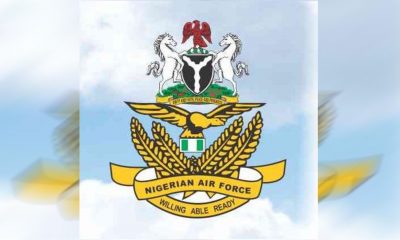
 News2 days ago
News2 days agoNAF Disowns Recruitment Adverts, Says It’s Fake
-
Nation2 days ago
Alumni, Others Launch Campus Care Initiative In Port Harcourt
-
News2 days ago
Rivers Chief Judge Frees 21 Awaiting Trial Inmates
-
Politics2 days ago
Natasha’s Counsel Writes Senate Over Court Judgment
-
Nation2 days ago
NIPR Practitioners Urge To Go Beyond Traditional Media Relations To Strategic Leadership Functions
-
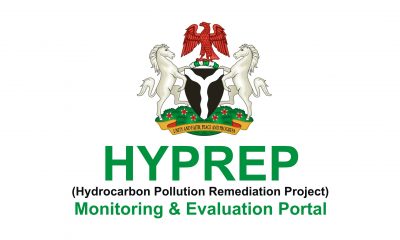
 Business2 days ago
Business2 days agoReplace Nipa Palms With Mangroove In Ogoni, Group Urges FG, HYPREP
-
News2 days ago
South-South contributes N34trn to Nigeria’s economy in 2024 – Institute
-
Niger Delta2 days ago
Police Rescue Kidnap Victim, Recover Pistol In A’Ibom

